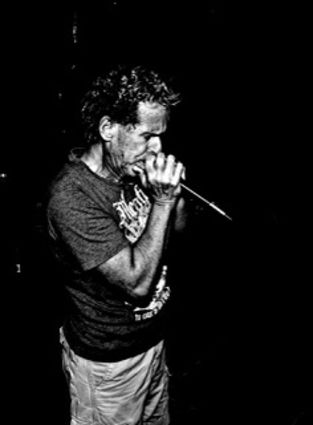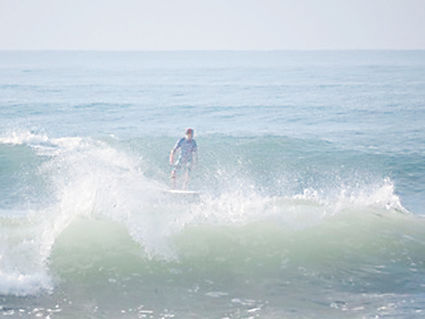Haxtun resident Jim LaJudes finds Open Mic to showcase talent
February 26, 2020
Jim LaJudes' life on the High Plains of Colorado, where his is surrounded by prairie grass and farm ground, could be likened to his being "a fish out of water." In Jim's case, however, he is a surfer without an ocean and a musician with limited venues.
Still, Jim says he loves the small town of Haxtun where he and his wife Janene now live. And, although he may find surfing a difficult sport to participate in without an ocean, he always brings his music with him.
Jim's music comes through a harmonica, the playing of which he admits is a "lost art." It requires a certain amount of commitment to stay in shape to play. "I spend at least an hour to an hour and a half each day practicing." He said he needs to do that in order to "keep his chops strong. Otherwise they turn to mush. In Miami or Texas, you could play every weekend. There is music everywhere. You don't have that here, you don't have it in Fleming, you don't have it in Sterling. Unless you go to the Front Range and I'm not planning on moving to the Front Range. I love Haxtun, Colorado."
Recently Jim did find a place in Haxtun to share his talent. He discovered that place on a sign that sat at the intersection of Colorado Avenue and Fletcher Street advertising an "Open Mic." Following that sign gave him a venue along with contact with local talent.
Open Mic, which is held at Haxtun's Church of the Brethren, is the brainchild of local musician and puppeteer Adele McConnell. McConnell started Open Mic in 2018 to showcase local talent. The event, held approximately once per month, draws a variety of instrumentalists and singers, including such regulars as Jula Bornhoft, Jeri Anderson, Dottie Oman, John Chapdelaine and Joe Bivins plus others.
That first year, the event went on hold while Adele and her husband Larry spent the winter in Arizona. But this year Adele convinced Jula to continue hosting the event through the winter. The next Open Mic is set for March 1, 6 p.m. at the church located at 137 North Logan in Haxtun. Jim said he is excited to be able to play with other musicians and hopes that Open Mic grows.
"When I first moved to Haxtun, I thought I wouldn't find a venue for my playing, but after I played that first time at Open Mic, Dottie came up to me and asked if I would play at the Christmas Cantata. So, I played that as well." He said he played all of the Christmas songs at the Cantata with his Chromatic Harmonica, which is one of two types he plays.
He explained that a Chromatic harmonica is like a keyboard. "It has all of the notes that a keyboard has. It has the white keys and the black keys." He elaborated. "You have a push button that you can see on the end of the harmonica, which changes the sound from a white key to a black key - Sharps and flats." He said the black keys can be both sharps and the flats. "When you blow it's a sharp, when you suck air in, it's usually flat."
He added that the Chromatic scale includes half notes all the way up to the next note and so on. He could do the same with Diatonic harmonica, the second type he plays, but said it takes more effort. "With the Diatonic you literally have to use your tongue and the muscle in the back of your throat to bend the notes to get to the sharps and the flats. You can still play the notes, but you are limited on the Diatonic because you may get only seven of the notes that are on the Chromatic."
Jim started his music career at age 12 or 13 playing drums in a band led by the husband of his sister Denise. "He shoved a Diatonic harmonica in my mouth and said, 'learn to play this.'" After playing that first harmonica for hours upon hours, he began to get good and also "got hooked on it."
A few years later, in what he recalls as the "Hippy Days" of the late 1960s. "I started jumping on stage and playing with people like Ten Years After and the Chambers Brothers."
Ten Years After was British Blues Rock Band that became popular in the late 1960s and early 1970s. The Chambers Brothers Band (Gang) originated in Mississippi and later relocated to Los Angeles, Calif. They remained unknown until they appeared in New York in 1965.
Jim said when he got older he started working in after-hours clubs. "The bars would close at 2 a.m. and we would go to an after-hours club and play until 5 or 6 in the morning." He clarified that the clubs were all in North Miami Beach, Fla., where he grew up. "Miami had a huge music venue because a lot of musicians came there, even in the 30s and 40s. They would play their jobs at a concert or at a bar or restaurant. Then they would to go to those joints. That is when you would run into people like Dizzy Gillespie." Gillespie, considered a trumpet virtuoso and improviser, is best known for playing Jazz but also for playing be bop and swing.
By the time Jim was in his teens, his musical influences were coming from such artists as Paul Butterfield of the Butterfield Blues Band, Blind Al (Alan Wilson) of Canned Heat, John Sabastian, who founded the Loving Spoonful, and Neil Young of Cosby, Stills and Nash. Butterfield, who spent his early years playing classical flautist, played blues harmonica as well as performing vocals. He also played piano and guitar.
In addition to playing harmonica, Wilson performed vocals on Canned Heat hits such as On The Road Again and Going Up To The Country.
Jim was also influenced by his friend and fellow harmonica player, Fingers Taylor (Greg Taylor). Originally from Wichita, Kan., Taylor played keyboard in Jimmy Buffet's Coral Reef Band, but later learned to play the harmonica.
The big-name harmonica players only came through Miami when they had recordings or major concert venues, said Jim. "Because I lived in Florida, I played all over Miami. I was a hired gun, so to speak. I would play for that sax player that they couldn't get." And, because he was the only harmonica player around all of the time, he could get the jobs. "So, I had that market pretty much sewn up because the only time they had other harmonica players was when a professional came into to town to play."
Being the only player, however, did not guarantee he would get hired. "When you go to a band and ask to set in and tell them you play a harmonica, they don't want to hear it. They think it's going to sound like Bob Dillon's style, no melody, no heart and soul. My comeback to them was always just let me play one song. If I sound bad, I'll walk off the stage and you never have to see my face again. Any time I did that, they would say, 'hey man, would you like to do another song?' Then the next thing you know, your name gets out there."
Jim said they liked him because he could make his harmonica sound like a saxophone, but it wasn't until later that he was able to get an authentic sound from what is called pedals. "Like guitar player use to make a fuzzy sound or a bluesy sound." He explained that it is done by hooking the pedal to the microphone and then hooking the microphone to the amplifier. "So, it comes out of the amp as that sound. It basically distorts the sound."
Jim credits his college classmate Jeff Mahl with teaching him to use a pedal. He and Mahl attended Santa Fe Junior College in Gainesville, Florida where Jim studied music. The two were also roommates and played music at different venues around Gainesville.
He said that while Mahl taught him to use the pedal, it was Lee Oskar who put him on the "right track." Oskar, who originally played harmonica for the Animals, played with the band War, which was famous for its hit song Low Rider.
Jim said Oskar was the first harmonica player to record and play through those types of pedals. "He was the pioneer of doing that," said Jim. "From what he did, I learned how to get that sax sound."
Jim and Janene moved to Haxtun in April of 2019 to be near his sister Marie Tamasy, who he first met 12 years ago in 2007. It's a story nearly as long as the story of his music. A story that began in England, traveled to Florida and then Texas and now continues in Haxtun.
Jim and Marie share the same father but different mothers. Their father, James John LaJudes, Sr., was stationed for a time in England while in the Military, where Marie was born. James later returned to the United States where Jim and his two sisters, Madelene and Denise, were born. Denise, who was born on the same date as Jim but four years prior, passed away in 1991.
When Marie's daughter Shannon learned that Marie had a brother, she found Jim on the Internet and sent him a letter. At first he thought she had contacted the wrong person, but then Marie called. "She said, 'hey, I'm your sister.' I said, no, you have the wrong guy, I'm James J. LaJudes. She said, 'no silly, you are named after dad. His middle name was John.' You are James John LaJudes, Jr.' So, I didn't know my middle name was John until 12 years ago."
Jim said even his mother didn't know his middle name was John and his birth certificate lists him as James J. LaJudes. "I used to ask my mom what my middle name was and she told me it was just the initial J." He said his mom also did not know he had another sister. Marie, however, knew she had a brother. "She has pictures of me when I was 10 or 11 years old, but I sat next to her at my dad's funeral and didn't know her," said Jim.
Jim and Marie met for the first time in 2007 in San Antonio, Texas. Jim was living in Texas at the time, and Marie was visiting her son in Austin.
Although Marie and Jim did not grow up together, they share a common Theology, a belief in the Bible and Jesus Christ. Marie and her husband retired Pastor Frank Tamasy founded the Prairie Baptist Church on the west edge of Haxtun, where Jim and Janene now attend along with Marie and Frank. Pastor Jonathan Prescott now pastors the church. Jim believes that his Theology is what sustained him during his recent battle with bladder cancer. "I look forward to studying Scripture because to me it is real. It's truth. I believe the reason I'm here is that God directed me here."
Jim was raised by his mother Yvette and his stepfather Anthony Aluotto in Miami, Fla., where he started playing the harmonica at age 12. He continues to call Anthony Aluotto, who passed away in 2014, dad. "He was a four-bronze Star recipient in World War Two. He was a great man," said Jim.
Jim said that Yvette, who owned and operated a grocery store called the Butcher Girl in North Miami Beach while he was growing up, encouraged him to play the harmonica, constantly reminding him to practice. "She just ate it up."
Jim said his stepfather advised him to enjoy playing his music, but to find a profession to earn a living. He did just that for 34-plus years, first operating an insurance agency in Florida and later moving the agency to Texas. The Agency specialized in estate planning and annuities. While he excelled at his job as an insurance agent, Jim continued to pursue his music, first in Florida and then in Texas where there were always places to play.
Even though Jim spent some time with his birth father growing up, he never saw him play the harmonica so was surprised to later learn that James John LaJudes, Sr., was also a professional harmonica player who once played at Carnegie Hall. "So, it must be in the genes," he said.
Jim did know that his mother and birth father were once in show business. "He sang and she was the comedian of the show. She was like Lucile Ball." He added that the two performed at both the Fountain Blue and the America Hotel. Yvette passed away in 2006.
Jim's insurance agency worked with attorneys to help with the legal issues surrounding estate planning annuities. He said he worked with a lot of senior citizens as well as Veteran, and also did the promotion for his business. That promoting included hosting seminars that enlisted celebrity speakers like Dennis Leonard a pitcher for Kansas City Royals who earned two World Series rings and Mannie Fernandez of the Miami Dolphins who collected two Super Bowl rings. "They would draw the crowd in and then we would pitch our product," Jim explained. Another speaker he enlisted was Dale Robertson from television series the Tales of Wells Fargo. He said Robertson told stories about Heady Lamar and showed him photos of Marilyn Monroe. Because Robertson was elderly and in a wheelchair at the time, they taped his 15-minute speech to show at the seminar. "So that was our dog and pony show on the road and that's how our business grew."
Although his business was doing well, Jim and Janene decided in 2013 to begin selling things in anticipation of retirement, which they did. They then moved to Costa Rica where Jim could enjoy his other love - surfing.
He also took his music to Costa Rica and while living there he and a guy named Rodney formed a two-piece band called the "Salty Dog." They played in bars and restaurants all over the Pacific side of Costa Rica, drawing an audience of expats, those who moved there from the States, and Canadians. He said they played music popular from 1969 to 1973. He played all of the horn sections through his pedal and amplifiers. "What I call my rig."
He said senior citizens love hearing him play the harmonica because it reminds them of their grandfather who played harmonica along with the banjo for blue grass or country music. "Even here at Open Mic, people come to me and say, my father or my grandfather used to play the harmonica."
It was a "wipe-out" while surfing in Costa Rica that led to a discovery that Jim was suffering from early-stage bladder cancer. "I bruised my leg, so I decided to take aspirin as a blood thinner," said Jim, adding that 24 hours later he started urinating blood. He went to the doctor, who diagnosed him with cancer that he had probably had for about eight months. He then had his first surgery the following Jan. 31 so surgeons could cut the cancer out.
Jim said he is now in good spirits and doctors have the cancer under control. "Fortunately, God was looking after my life," said Jim. "It didn't go to my lymph nodes. It didn't go behind the lining of my bladder. It didn't go into my muscles. It didn't go into my lungs or kidneys. That was all God. My faith has brought me through this. If I hadn't believed in the word of God and my Savior Jesus Christ, I would have never gone through this with peace."

Courtesy photo
JIM LAJUDES playing his harmonica.
At age 65, Jim said he likes playing blues and rock but finds he now tends to lean toward Jazz. "But there is a lot of Blues that is Jazzy. I still like the blues and rock, but jazz is my favorite of all." He said he especially loves the music of John Coltrane (1926-1967), a jazz saxophonist and composer, and Duke Ellington, who led a jazz orchestra from 1923 until his death in 1974.
While Jim enjoys listing to and emanating many harmonica players, he said his vote for the best harmonica player of all time is Toots Thielemans. Born Jean-Baptiste Frédéric Isidor, Baron Thielemans, Toots Thielemans, was a Belgian jazz musician. According to Wikipedia, Thielemans was known for his harmonica playing, but also played the guitar, had whistling skills and was a composer. "There are several," said Jim, "but in my heart of hearts, he is the best."
Those of us who have had the privilege of hearing Jim play might say he seems a fitting protégé for Thielemans.











Reader Comments(0)